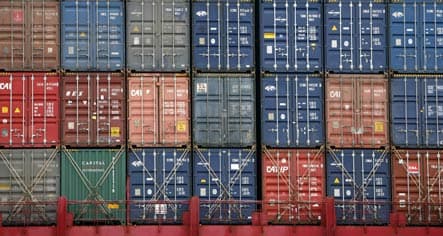Merkel defends Germany's dependence on exports

Chancellor Angela Merkel defended on Monday Germany's heavy dependence on exports that has made Europe's largest economy one of the biggest casualties of the global recession.
"Are we too dependent on exports? I believe there is no alternative to being a country with strong exports," Merkel told a conference of the country's main industry association, the BDI.
"Otherwise we are putting our standard of living at risk," she said.
Germany is the world's biggest exporter of goods, with particular strength in machinery, chemicals and cars, and has been hit hard by the collapse in demand around the world for its products.
The German government expects the economy to shrink by around six percent this year, the second biggest slump among advanced economies after Japan. Merkel reiterated that it was important to tackle the causes of the financial crisis and the global downturn, implementing decisions made at a summit of the Group of 20 major economies in London in April.
"We have a huge interest in tackling the causes of this crisis," she said.
Economy Minister Karl-Theodor zu Guttenberg, speaking at the same event, agreed, saying "a broad industrial base is irreplaceable and unavoidable for Germany."
Merkel also rejected widespread criticism from firms, experts and other countries that her government was slow to act when the financial crisis hit the global economy in 2008, or that it was not doing enough.
Germany's two stimulus packages, combined worth more than €80 billion ($111 billion), are also boosting demand for imports from other countries, "which is of clear benefit to the world economy," Merkel said.
The conservative chancellor, running for a second term in general elections on September 27, also defended supporting a rescue of General Motors' Opel unit with taxpayers' money while letting retailer Arcandor file for insolvency.
Arcandor, she said, was in trouble before the crisis hit Germany last year, and therefore is not entitled to receive funds and loan guarantees from a government package set up to help German firms through the downturn.
"It was not linked to the financial crisis. It may have exacerbated the problems, but there were weaknesses before the crisis," she said. "And insolvency does not have to mean that the company or jobs... will disappear."
Letting Opel file for insolvency would have been too complex, however, because of its ties to GM and due to differences in regulations among other European countries where GM has factories like Britain or Spain, she said.
Merkel's government decided last month, days before GM filed for bankruptcy protection in the US, to support a Russian-financed takeover of Opel by Canadian auto parts maker Magna with state loans and loan guarantees.
Comments
See Also
"Are we too dependent on exports? I believe there is no alternative to being a country with strong exports," Merkel told a conference of the country's main industry association, the BDI.
"Otherwise we are putting our standard of living at risk," she said.
Germany is the world's biggest exporter of goods, with particular strength in machinery, chemicals and cars, and has been hit hard by the collapse in demand around the world for its products.
The German government expects the economy to shrink by around six percent this year, the second biggest slump among advanced economies after Japan. Merkel reiterated that it was important to tackle the causes of the financial crisis and the global downturn, implementing decisions made at a summit of the Group of 20 major economies in London in April.
"We have a huge interest in tackling the causes of this crisis," she said.
Economy Minister Karl-Theodor zu Guttenberg, speaking at the same event, agreed, saying "a broad industrial base is irreplaceable and unavoidable for Germany."
Merkel also rejected widespread criticism from firms, experts and other countries that her government was slow to act when the financial crisis hit the global economy in 2008, or that it was not doing enough.
Germany's two stimulus packages, combined worth more than €80 billion ($111 billion), are also boosting demand for imports from other countries, "which is of clear benefit to the world economy," Merkel said.
The conservative chancellor, running for a second term in general elections on September 27, also defended supporting a rescue of General Motors' Opel unit with taxpayers' money while letting retailer Arcandor file for insolvency.
Arcandor, she said, was in trouble before the crisis hit Germany last year, and therefore is not entitled to receive funds and loan guarantees from a government package set up to help German firms through the downturn.
"It was not linked to the financial crisis. It may have exacerbated the problems, but there were weaknesses before the crisis," she said. "And insolvency does not have to mean that the company or jobs... will disappear."
Letting Opel file for insolvency would have been too complex, however, because of its ties to GM and due to differences in regulations among other European countries where GM has factories like Britain or Spain, she said.
Merkel's government decided last month, days before GM filed for bankruptcy protection in the US, to support a Russian-financed takeover of Opel by Canadian auto parts maker Magna with state loans and loan guarantees.
Join the conversation in our comments section below. Share your own views and experience and if you have a question or suggestion for our journalists then email us at [email protected].
Please keep comments civil, constructive and on topic – and make sure to read our terms of use before getting involved.
Please log in here to leave a comment.